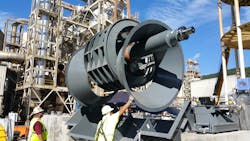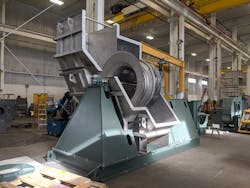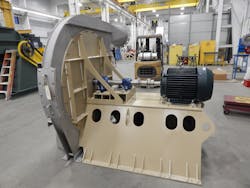Boiler fans support many critical functions in biomass energy applications. Because of this, fans must be able to withstand the harsh conditions found in biomass energy plants, such as heavy dust loads and very high temperatures, to deliver reliable performance and efficiency, day in and day out.
Specifying the appropriate equipment for this demanding job is only half of the equation, however. The other half is making sure the equipment is properly maintained and monitored to identify and prevent potential problems before they lead to failure.
Benefits of Proactive Monitoring
Proactively monitoring and maintaining air blowing equipment not only helps ensure maximum uptime and productivity, but it also reduces power consumption caused by inefficient fan operation, mitigates safety hazards, and helps maintenance teams avoid costly, unexpected repairs.
For example, with condition monitoring, maintenance teams can identify potential problems before they become critical, allowing for timely repairs and replacements. When small problems are identified early, maintenance teams can quickly diagnose and correct the problems before they lead to costly equipment damage or failure.
Furthermore, a proactive approach to fan maintenance can extend the lifespan of the equipment, saving replacement costs.
Here, we’ll explain the various types of fans found in boiler applications and their most common maintenance issues—along with maintenance and monitoring best practices to help teams get ahead of potential failures.
Three Types of Fans in Boiler Applications
In biomass energy applications, both Primary Air Fans and Secondary Air Fans are involved in the combustion of fuel. Primary fans in a boiler are the bark feeder fans and the over-fire air fans. The bark feeder fans supply combustion air and convey power to stoke the furnace with bark.
From there, secondary and tertiary air fans supply combustion air at higher levels in order to take advantage of the heating value of the gasified bark. These fans are usually forced draft (FD) fans. Induced Draft (ID) Fans are used to create negative air pressure and remove flue gases from the combustion chamber.
Common Maintenance Issues
As with any piece of industrial equipment, boiler fans are subject to wear and tear. And these fans often operate in extreme conditions which only accelerate this process. ID fans are especially susceptible to premature wear as they operate in highly corrosive and erosive environments.
The following are some of the most common maintenance issues associated with boiler fans:
Bearing Wear and Failure: Fan bearings are more likely to fail prematurely when operating in high temperatures or with inadequate lubrication. These conditions cause increased friction that can further damage the fan;
Misalignment or Imbalance: Fan components can become misaligned or imbalanced for a variety of reasons. For example, high dust loads and uneven dust accumulation on fan blades can cause an imbalance that puts stress on the fan and can lead to failure if left unchecked;
Corrosion: No matter how rugged a fan’s construction, over time parts can corrode and weaken. For example, silencer baffles can corrode and then collapse, blocking the airflow into or out of the fan. This immediately degrades fan performance and increases noise. If the deterioration continues, it can lead to parts of the silencer baffles breaking off and entering the fan, which can destroy the impeller;
Lack of Lubrication: Damper or variable inlet vane (VIV) bearings and/or bushings must be properly lubricated. If the bearing is neglected or the bushing fails, the damper blade shaft can become stuck and fail to rotate properly. This can lead to blades becoming out-of-sync—which increases vibration, creates excessive noise, and degrades fan performance. Blades that are out-of-sync can even lead to aerodynamic disturbances that can cause a blade to break off, enter the fan, and lead to system failure.
Proactive Fan Operation and Maintenance
Both field service and proactive monitoring systems are essential for ensuring the proper operation and maintenance of boiler fans. These techniques should be used in combination to keep equipment running at optimal levels of performance, efficiency, and reliability.
Real-Time Condition Monitoring: Vibration is often one of the first indicators that a potential problem is brewing. Vibration sensors permanently mounted to the fan can continuously monitor fans for unusual or excessive vibrations and alert the operators to potential issues.
Similarly, temperature sensors can be used to monitor equipment so problems like overheating can be promptly addressed, and power monitoring sensors can detect changes in a fan’s power consumption to indicate when a fan is running less efficiently than normal. This allows maintenance teams to respond quickly before these issues impact production.
Regular Inspections and Preventive Maintenance: It should go without saying that regular preventive maintenance and inspections are a must for boiler fans (and any critical equipment operating in a harsh industrial environment). This typically includes activities like balancing the fan, as well as changing and relubricating motor bearings, couplings, actuator, and damper linkage(s). Regular fan service should also include less obvious inspections of the fan’s aerodynamic and mechanical properties.
Furthermore, while modern condition monitoring technologies can be invaluable for providing early indication of a problem, they too can fail or become misaligned. Because of this, manual inspections should be sure to include a check of any condition monitoring sensors to verify readings and ensure they are working properly.
Conclusion
Proactively maintaining boiler fans is essential for safe, efficient, and reliable operation. Teams that stay on top of preventive maintenance and inspections—and also employ modern condition monitoring techniques—will be well equipped to prevent unexpected equipment failures, increase uptime, and extend the life of their air blowing equipment.
##########
A fan engineer with a wealth of industry experience, the author joined Willowbrook IL-based The New York Blower Company in 2018. There, Jones primarily focuses on providing engineering support for heavy industrial projects. He holds a master’s degree in mechanical engineering from Clemson University.
About the Author
Doug Jones
Fan Engineer - New York Blower Company
A fan engineer with a wealth of industry experience, the author joined Willowbrook IL-based The New York Blower Company in 2018. There, Jones primarily focuses on providing engineering support for heavy industrial projects. He holds a master’s degree in mechanical engineering from Clemson University.


